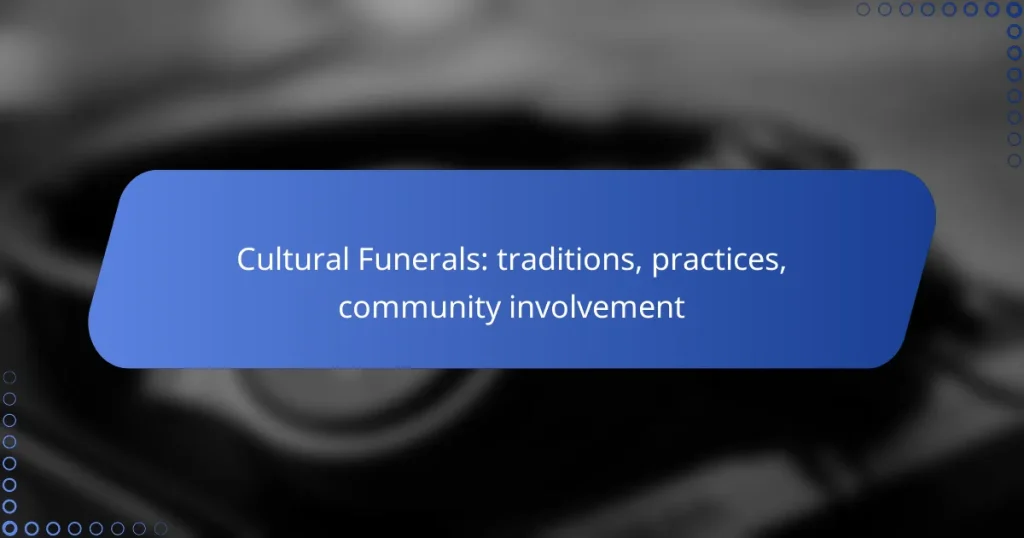Canada’s multicultural society is reflected in its diverse funeral traditions, where practices vary widely among communities based on religious beliefs and cultural heritage. These services often incorporate personalized elements that honor the deceased’s life and values, while community involvement plays a crucial role in supporting the bereaved through emotional and practical assistance.
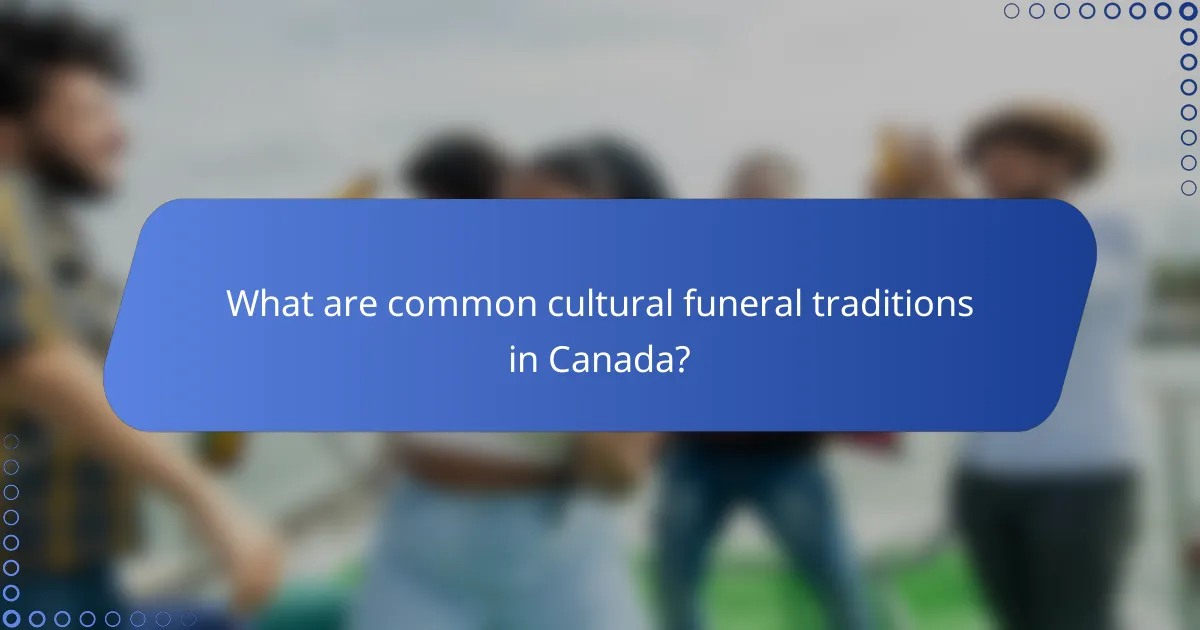
What are common cultural funeral traditions in Canada?
Canada is home to a diverse range of cultural funeral traditions that reflect its multicultural society. Common practices vary significantly among different communities, often influenced by religious beliefs, cultural heritage, and regional customs.
Indigenous ceremonies
Indigenous funeral traditions in Canada are deeply rooted in spirituality and connection to the land. Ceremonies often include rituals such as drumming, singing, and storytelling, which honor the deceased and their journey to the afterlife.
Each Indigenous community may have unique practices, but many emphasize the importance of community involvement and support during the grieving process. Traditional foods may be shared, and gatherings can last several days to allow for collective mourning and remembrance.
Christian burial practices
Christian funeral practices in Canada typically involve a service held in a church, followed by burial or cremation. Services often include prayers, hymns, and eulogies that celebrate the life of the deceased and provide comfort to the bereaved.
Burial is often accompanied by the use of a casket and a graveside service, while cremation may involve a memorial service at a later date. Families may also choose to include personal touches, such as displaying photographs or mementos during the service.
Jewish mourning customs
Jewish mourning customs in Canada follow specific traditions that emphasize respect for the deceased and support for the grieving family. The funeral typically occurs shortly after death, often within 24 hours, and is followed by a period of mourning known as Shiva.
During Shiva, family members gather in the home of the deceased to receive visitors and share memories. This period lasts for seven days, during which time the community provides meals and support to the grieving family.
Asian cultural rituals
Asian funeral traditions in Canada vary widely among different cultures, including Chinese, Indian, and Vietnamese practices. For instance, Chinese funerals may include rituals such as burning incense and offering food to the deceased, reflecting beliefs in the afterlife.
Indian funerals often involve cremation, followed by a mourning period where family members wear white and participate in rituals to honor the deceased. Vietnamese customs may include elaborate ceremonies with offerings and ancestral worship, emphasizing respect for family lineage.
Secular memorial services
Secular memorial services in Canada focus on celebrating the life of the deceased without religious elements. These services can be personalized to reflect the individual’s life, interests, and values, often incorporating music, poetry, and personal anecdotes.
Families may choose to hold the service in a variety of locations, such as community centers or parks, and can include elements like photo displays or video tributes. This approach allows for a flexible and meaningful way to honor the deceased while providing comfort to attendees.
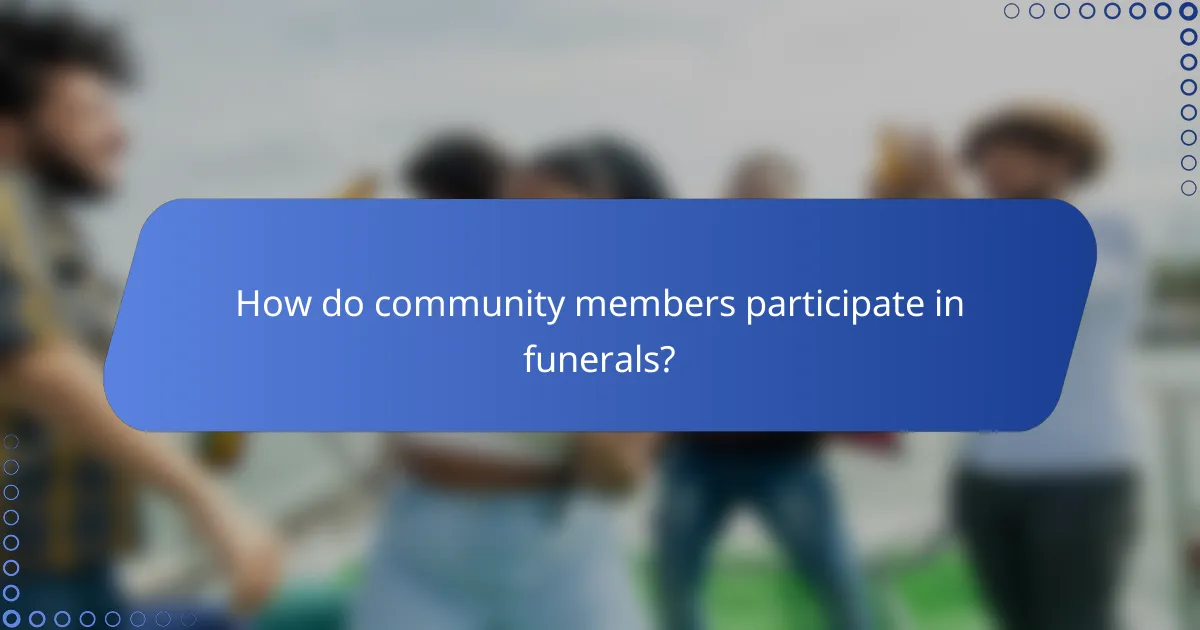
How do community members participate in funerals?
Community members play a vital role in funerals by providing emotional and practical support to the bereaved family. Their involvement can range from offering food and assistance to organizing memorial events and participating in cultural rituals.
Providing food and support
Bringing food to a funeral is a common way for community members to show support. This can include preparing meals for the family or contributing dishes for gatherings after the service. In many cultures, sharing food symbolizes unity and compassion during a time of grief.
Additionally, community members often help with logistical tasks, such as setting up the venue or assisting with transportation. Offering emotional support through visits or phone calls can also be crucial, as it helps the family feel less isolated in their sorrow.
Organizing memorial events
Community members frequently take the initiative to organize memorial events, such as vigils or remembrance services. These gatherings provide a space for friends and family to share memories and celebrate the deceased’s life. They can be held in various locations, including homes, community centers, or places of worship.
When planning these events, it is important to consider the preferences of the bereaved family. This includes selecting appropriate dates, times, and venues, as well as coordinating speakers or activities that honor the deceased’s legacy.
Participating in rituals
Participation in cultural rituals is a significant aspect of community involvement in funerals. These rituals can vary widely depending on cultural and religious backgrounds, but they often include practices such as prayers, songs, or symbolic gestures. Engaging in these rituals helps to create a sense of closure and connection among attendees.
Community members should be respectful and mindful of the family’s traditions when participating in these rituals. Understanding the significance of specific practices can enhance the collective experience and provide comfort to those grieving.
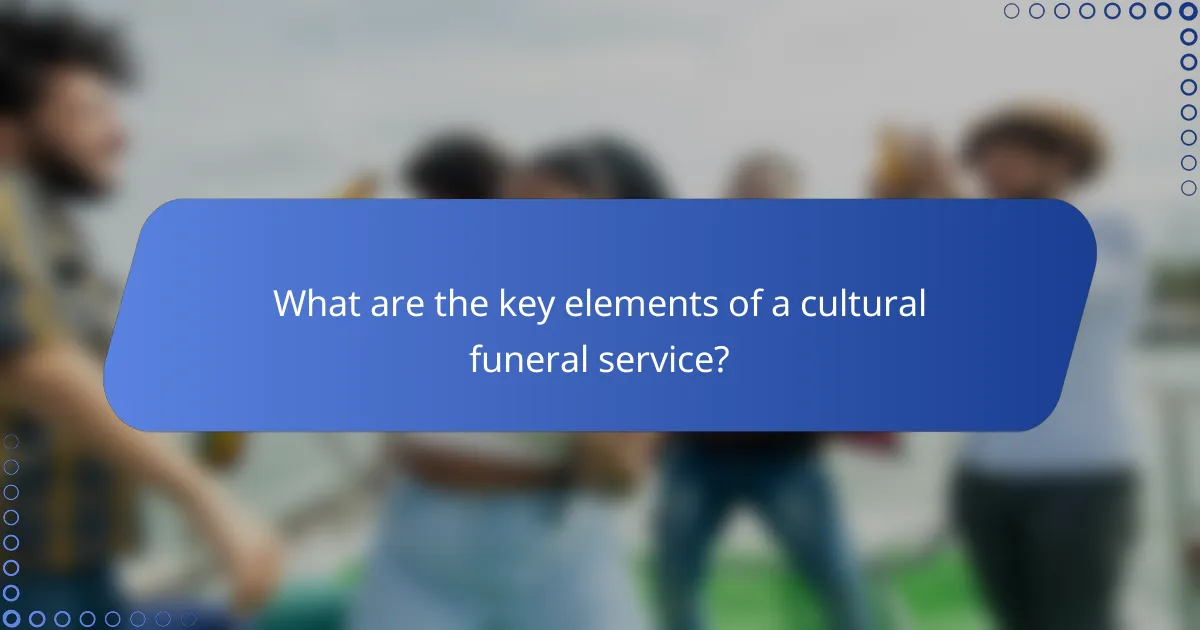
What are the key elements of a cultural funeral service?
Cultural funeral services typically encompass personalized elements that reflect the deceased’s life, beliefs, and community values. Key components often include eulogies, traditional music, and symbolic rituals that honor the individual and provide comfort to the bereaved.
Personalized eulogies
Personalized eulogies play a crucial role in cultural funerals, as they offer a heartfelt tribute to the deceased. These speeches often highlight significant life events, achievements, and the impact the individual had on family and friends.
When crafting a eulogy, consider including anecdotes that resonate with the audience, as these stories can evoke shared memories and emotions. Aim for a balance between humor and solemnity, depending on the personality of the deceased and the preferences of the family.
Traditional music and hymns
Traditional music and hymns are integral to many cultural funerals, providing a backdrop that enhances the emotional atmosphere. These musical selections often reflect the deceased’s cultural heritage and personal preferences, creating a sense of familiarity and comfort for attendees.
Incorporating live performances or recorded music can elevate the experience. Common choices may include religious hymns, folk songs, or classical pieces that hold special meaning for the family. Ensure that the music aligns with the overall tone of the service.
Symbolic rituals
Symbolic rituals are essential in cultural funerals, as they serve to honor the deceased and facilitate the grieving process. These rituals can vary widely across cultures and may include lighting candles, offering flowers, or performing specific prayers.
Consider the significance of each ritual and its relevance to the deceased’s beliefs. Engaging the community in these practices can foster a sense of unity and support among attendees, helping them to collectively process their grief.
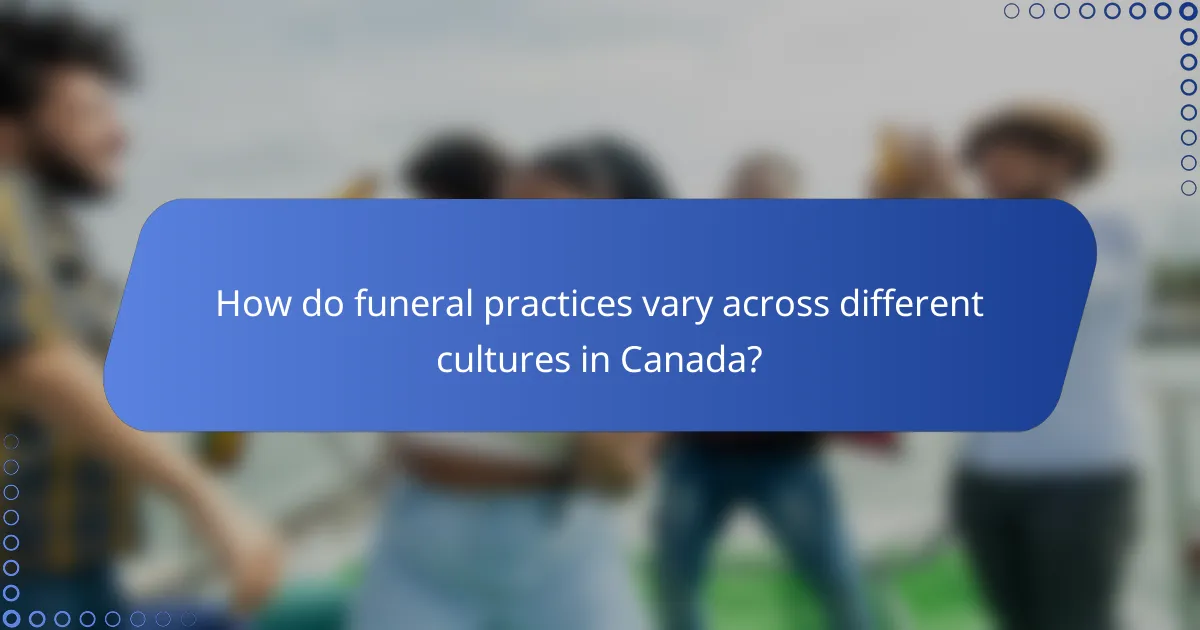
How do funeral practices vary across different cultures in Canada?
Funeral practices in Canada are diverse and reflect the country’s multicultural landscape. Different communities observe unique traditions that influence how they honor the deceased, ranging from ceremonies to burial practices.
Regional differences
Canada’s vast geography contributes to varied funeral customs. In the East, for instance, many families may opt for traditional wakes and church services, while in the West, outdoor memorials and celebrations of life are more common. Indigenous communities often incorporate spiritual rituals, such as smudging or drumming, that reflect their cultural heritage.
Urban areas tend to have more diverse practices due to the mix of cultures, whereas rural regions may adhere to longstanding local traditions. This regional variation means that families often choose practices that resonate with their community’s values and beliefs.
Religious influences
Religious beliefs significantly shape funeral practices across Canada. Christian denominations, including Catholicism and Protestantism, typically follow structured services that include prayers, hymns, and eulogies. In contrast, Jewish funerals emphasize simplicity and prompt burial, often within 24 hours of death, accompanied by specific rituals like the Kaddish prayer.
Other faiths, such as Islam and Hinduism, have distinct customs as well. Islamic funerals involve a communal prayer service and a focus on burial, while Hindu practices may include cremation and rituals that honor the cycle of life and death. These religious influences guide families in their choices and help provide comfort during mourning.
Modern adaptations
Modern adaptations of funeral practices in Canada reflect changing societal values and technological advancements. Many families now incorporate personalized elements, such as video tributes or themed memorials, to celebrate the life of the deceased in unique ways. Eco-friendly options, like green burials, are also gaining popularity as people become more environmentally conscious.
Additionally, virtual services have emerged, allowing families to connect with distant relatives and friends. This adaptation has made it easier for people to participate in memorials, regardless of their location. Balancing tradition with modernity, families are increasingly finding ways to honor their loved ones that resonate with both their cultural background and contemporary values.
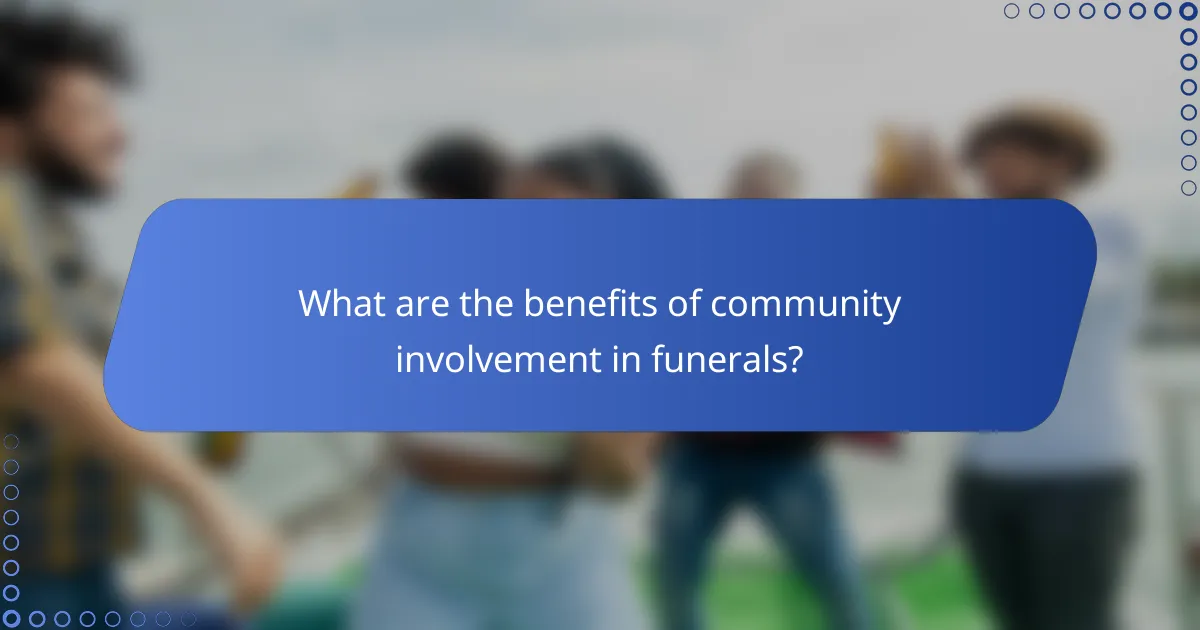
What are the benefits of community involvement in funerals?
Community involvement in funerals provides emotional support, fosters connections, and helps families navigate their grief. Engaging the community can create a sense of belonging and shared remembrance, which is vital during such a challenging time.
Emotional support for families
Emotional support from the community can significantly ease the burden on grieving families. Friends, neighbors, and extended family members often come together to offer condolences, share memories, and provide practical assistance, such as meal preparation or childcare.
This collective support can help families feel less isolated in their grief. When community members participate in the funeral process, they validate the deceased’s life and the family’s loss, which can be comforting during a time of sorrow.
Encouraging community involvement can take various forms, such as organizing a memorial service, creating a meal train, or simply being present to listen. Families should consider reaching out to their community for help, as accepting support can be a crucial step in the healing process.
